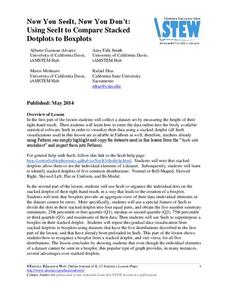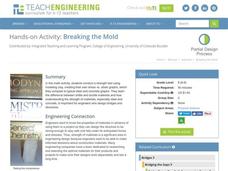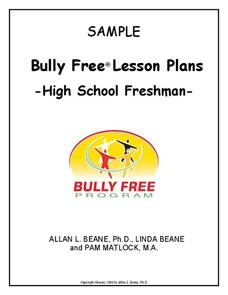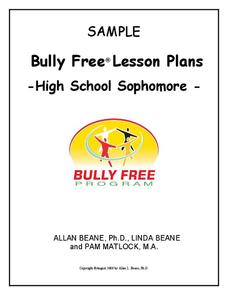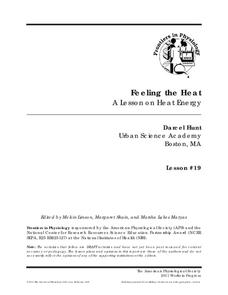Statistics Education Web
Now You SeeIt, Now You Don't: Using SeeIt to Compare Stacked Dotplots to Boxplots
How does your data stack up? A hands-on activity asks pupils to collect a set of data by measuring their right-hand reach. Your classes then analyze their data using a free online software program and make conclusions as to the...
Teach Engineering
Breaking the Mold
A little too much strain could cause a lot of stress. Groups conduct a strength test on clay. Using books as weights, pupils measure the compression of clay columns and calculate the associated strain and stress. Teams record their data...
TryEngineering
Program Your Own Game
Young computer scientists get to see what it's like to be a software engineer as they use free online software to design a computer game. They play and evaluate games groups created to round out the activity.
World Intellectual Property Organization
Learn from the Past, Create the Future: Inventions and Patents
3D printers, selfie sticks, smart watches. GPS, self-driving cars, YouTube. Imagine life without inventions. Believe it or not, these items were all invented in the last 10 years. Inventions, and the inventors responsible for them, are...
Bully Free Systems
Bully Free Lesson Plans—Seventh Grade
Having a hard time defining bullying with your seventh graders? Discuss the different types of behavior one would see in a bullying situation with a series of lessons, worksheets, and group activities.
Bully Free Systems
Bully Free Lesson Plans—Ninth Grade
"Bullying and Prejudice" and "Do You Cyber Bully," two lessons from a complete Bully Free program, serve as samples of the approach used in a unit designed to bring awareness to and to combat bullying. Each lesson asks class members to...
Bully Free Systems
Bully Free Lesson Plans—10th Grade
Two lessons, "What Does Cyber Bullying Look Like?" and "Factors Influencing My Reporting the Bullying of Others," serve as examples of the 12 included in a Bully Free curriculum. Each plan includes discussion questions, an activity, and...
Bully Free Systems
Bully Free Lesson Plans—12th Grade
Two sample lessons from a curriculum unit on bullying provide high school seniors with an opportunity to assess their online and cell phone behavior and to consider how they can offer support to bullied students. Each plan includes an...
Bully Free Systems
Bully Free Lesson Plans—Eighth Grade
Middle schoolers are likely very familiar with the concept of bullying and cliques. Discuss their experiences and brainstorm ways to handle peer conflict and feelings of exclusion with a poem that focuses on bullying, and a second lesson...
American Physiological Society
Thermal Insulators: Keep it Hot!
There's nothing like a cup of hot chocolate on a chilly winter's day. Except for when that hot chocolate quickly becomes lukewarm chocolate ... or even cold chocolate. What material provides the best insulation to keep the chocolate from...
American Physiological Society
Did I Observe it or Infer it?
Take the mystery out of inquiry! When young scientists learn to use their keen powers of observation to make smart inferences about a situation, they are well on their way to understanding what the scientific method is all about. Using...
American Physiological Society
It’s the Heart of the Matter
Get the class jumping for joy with a fascinating look at matters of the heart. Learners perform physical tasks, collect and analyze heart rate data, and study conditions that affect heart health. Use the action-packed lesson plan to...
American Physiological Society
What Environmental Conditions Lead to the Hatching of Brine Shrimp?
Will changing the environment in which brine shrimp live impact their reproductive success? Young scientists get hands-on experience studying the habitat of brine shrimp in a two-week immersion lesson. The teacher's guide provides all of...
American Physiological Society
How Does the Density of a Liquid Affect the Buoyancy of an Object?
Here's a lesson plan that will really float your boat! Introduce physical science scholars to the relationship between buoyancy and density through an assortment of individual and collaborative exercises. Lab groups work together to...
American Physiological Society
Why is Kettle Corn Cooked in Copper Pots?
The kitchen — it's not just for eating anymore! Specific heat is often a difficult concept to grasp, so give it context by relating it to cooking. Learners gain experience in the principles of thermal energy transfer by designing an...
American Physiological Society
Sit On It
How do product designers come up with the variety of things we see in stores and on TV every day? They identify a need, then create something that meets that need. Sounds simple, right? A two-week lesson puts seventh graders in that role...
American Physiological Society
Feeling the Heat
How do the changing seasons affect the homes where we live? This question is at the forefront of engineering and design projects. Challenge your physical science class to step into the role of an architect to build a model home capable...
Concord Consortium
Yearbook Pictures
Sorting memories doesn't have to be difficult. Young mathematicians evaluate two different methods of sorting yearbook pictures. They answer a set of questions to explore each method, then develop their own sorting procedure based on...
Ereading Worksheets
Figurative Language for Edgar Allen Poe
Are your classes weary of dreary worksheets? Are the learners nearly napping? Thrill them, fill them with delight with an interactive worksheet that asks them to identify the figurative language Edgar Allen Poe uses to add horror and...
Smithsonian Institution
Trait Tracker
Help mice beat the odds with an exciting activity about traits. Biologists discover the role of diet and other factors on animal traits by participating in a simulation activity. Teams collect and evaluate data to understand how certain...
Smithsonian Institution
Weather Widget
What's so difficult about predicting the weather? Scholars work collaboratively to build a device that models how meteorologists use computers to forecast weather. Team members collect and interpret data while working together to...
Curated OER
Scientific Inquiry Pretest
In this scientific inquiry worksheet, students match words to definitions and fill in the blanks for scientific inquiry. Students complete 9 problems total.
Curated OER
Scientific Inquiry Post-Test
In this scientific inquiry post-test worksheet, students complete a 7 question matching activity that uses vocabulary associated with the inquiry process. They answer 2 multiple choice questions about independent and dependent variables.
Curated OER
Daylight or Darkness: Mealworms
In this mealworms worksheet, students test if the mealworms like daylight or darkness. Students complete 5 questions total on this worksheet.


